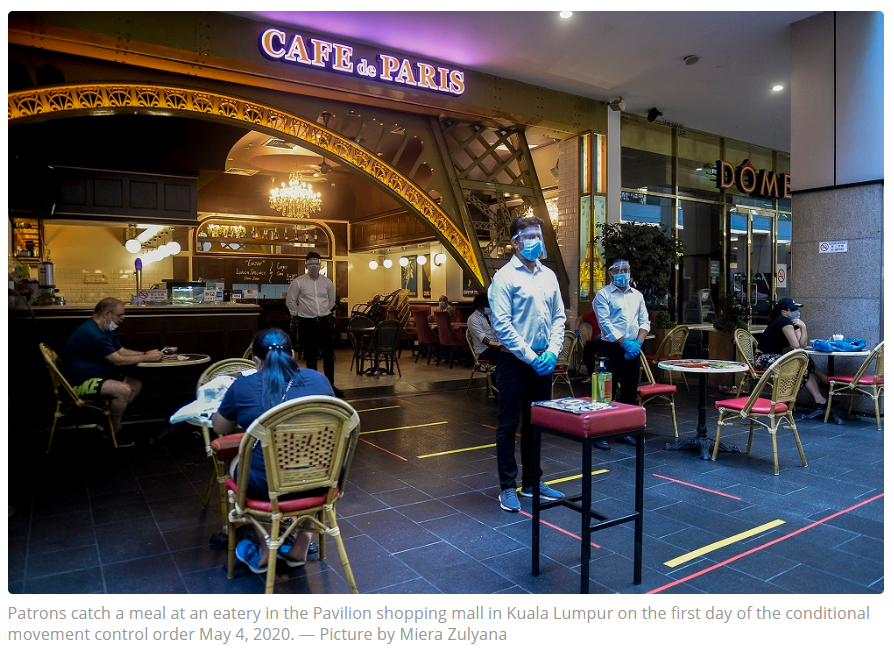Covid-19: Malaysian retailers say job cuts, store closures inevitable as ‘new normal’ bites
KUALA LUMPUR, May 6 — Malls half-empty with long queues outside entrances manned by guards.
Most eateries shuttered.
Inside those that are open, patrons seated at tables set more than a metre apart, in a bid to reduce guest capacity, with only a handful of waiters to serve them.
For retailers, this imagined “new normal” entails painful ramifications.
With social distancing expected to remain in place for the rest of the year at least, businesses say lifting the movement control order (MCO) will do little to curb plummeting sales.
This makes tough decisions inevitable for micro and small businesses. With a tight cash flow and dwindling profit margins, only two options make survival possible — shops are either shut for good or workers get laid off.
“Many retailers are already implementing cost cuts, at least 80 per cent,” Datuk Gary Chua, president of the Malaysian Retail Chain Association told Malay Mail.
“30 per cent of them expect to lay workers off in the next six months.”
Culling jobs or closing shop branches will likely be the main focus for troubled retailers bogged down by piling costs, Chua said, a view underlining the weak sentiment among businesses regardless of size.
Up to 80 per cent of retailers said they have already laid out plans or are in the midst of trimming losses, the MRA president said, noting that some have carried out cost-cutting measures since last year.
Large-scale closure

Another 50 per cent said they may be forced to shutter if conditions fail to improve or state help is not extended for the next six months, according to Chua.
Consumer sentiment in the retail sector was already at low levels in the last two quarters of 2019, as inflation and stagnant wages dashed purchasing power.
Non-permanent staff were the first to go, followed by a second layer of permanent workers. For the latter, a large number have been told to go on unpaid leave or in worst cases, retrenched.
Those lucky enough to keep their jobs saw huge pay cuts of anywhere between 10 and 20 per cent. Most retail workers are low-wage earners — typically between RM1,500 to RM1,900 — which means the cuts biting into their already meagre disposable income.
For retailers, salaries account for over a third of operating costs followed by rental, according to Chua.
Retail Group Malaysia estimates RM6.18 billion is expected to be staff cost, comprising salaries and wages, allowances and contributions to the Employees Provident Fund and Social Security Organisation.
Monthly rental, even for small premises in non-premium malls, can go up to RM20,000 a month.
In premium malls located in the city centre like Suria KLCC or Pavilion Kuala Lumpur, rental for small units can be triple that, while bigger spaces can cost up to RM300,000 a month.
“Nobody is going to wait until the worst comes in the next six months,” Chua lamented.
“They’re doing what is necessary now. Even with the MCO lifted, businesses expect sales to be at best just 50 per cent of what they earned before the restrictions,” he added.
“So rather than continue making losses, they might as well close shop or cut jobs.”
Prihatin ineffective
Retailers were expected to bear RM20.48 billion in operational and staff costs during the first six weeks of the MCO alone, according to Retail Group Malaysia’s estimates.
RM14.31 billion alone was spent on operating costs that included rent, head office expenses, insurances, advertising and promotional expenses, and repair and maintenance, business paper The Edge reported mid-April.
The Perikatan Nasional (PN) government, in an effort to alleviate some of these costs, announced several measures under the RM260 billion Prihatin stimulus package.
These included wage subsidies targeted at small and medium enterprises, tax incentives for premise owners to cut rent and power bill rebates.
But for a large number of businesses, such assistance is mired in red tape. Chua claimed many have been turned away by the highly bureaucratic application process, citing the conditions set for wage subsidies as an example.
The government said it would only subsidise up to RM1,200 of a worker’s salary for enterprises that hire more than 200 people for six months, on the condition that the staff is retained.
Cheaper to cut jobs

But as businesses expect a rebound only starting next year, paying salaries even at a subsidised rate will still be costly. Chua said this makes retrenchment the more cost-effective option.
“You look at the number of claims from Perkeso… there aren’t that many because businesses feel it’s just too much hassle,” he said.
Only 6,000 unemployment insurance claims have been made to date, Perkeso revealed last week.
Meanwhile, only smaller malls are expected to benefit fully from the power bill discounts announced under the Prihatin package, the MRA president said.
Under the Prihatin package, hotels operators, travel agencies, local airlines offices, shopping malls, convention centres and theme parks are to receive a 15 per cent discount up until September.
“As for the power bill, only small malls will benefit when retailers in the bigger malls also need help. They’re the biggest employers, but they’re not getting much assistance.”
Malaysia went into its fifth phase of the MCO, also called conditional MCO, on Monday — allowing several sectors to operate fully under strict restrictions in a bid to kickstart the economy.
Source: https://www.malaymail.com/news/malaysia/2020/05/06/covid-19-malaysian-retailers-say-job-cuts-closures-inevitable-as-new-normal/1863440


 Thailand
Thailand




